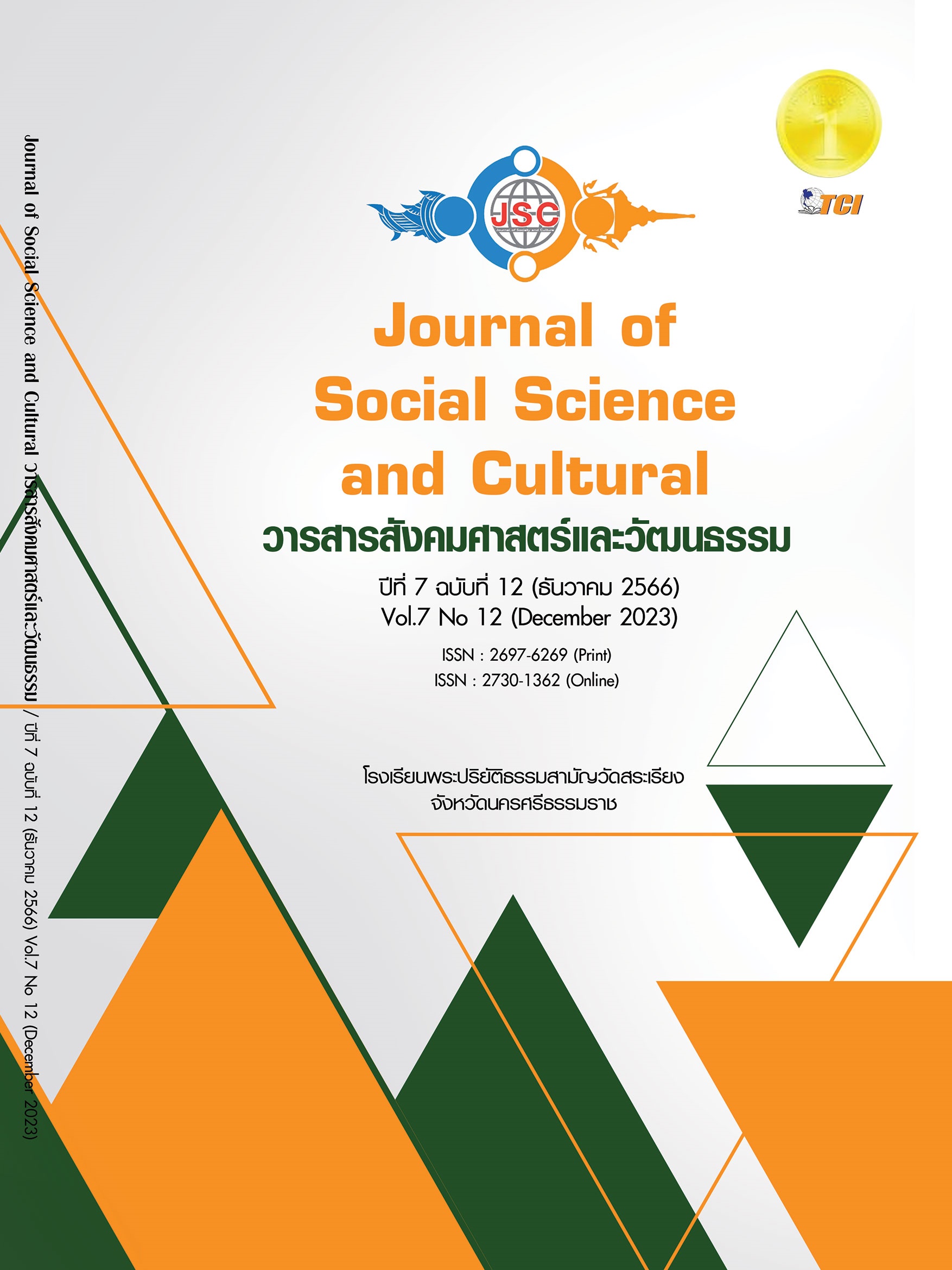BELIEFS AND RITUALS ACCORDING TO THE ROLE OF SPIRITUAL LEADERS IN THE CHINESE DEITY EMBODIMENT TOWARDS THE SHRINE OF TRANG PROVINCE
Main Article Content
Abstract
The objective of this study is to investigate the ceremonial rituals of the Chinese deity embodiment, the role of, and contemporary attitudes toward the Chinese deity embodiment in contemporary society. The research adopts a qualitative approach and utilizes tools such as in-depth interviews and group discussions. with 15 experts and 30 local residents. Focusing on a sample population in Tambon Thap Thiang, Ban Khwan, Khok Lo, Nam Phut, and Ban Pho, within Trang Province's Mueang District. The "entering the embodiment" ritual comprises several vital components, including Taoist rituals, Chinese deity embodiment, active participation of local worshippers, entering the embodiment, Koteng pole raising ceremony, observe religious precepts, pray, miraculous performances, and illumination of oil lamps. Chinese deity embodiment plays roles in economic aspects, societal interactions, philanthropy, benefits provision, religious paths, public health, and symbols created to establish the national identity of Thai people with Chinese heritage. These symbols express the adaptation of Thai-Chinese individuals to the multicultural society, encompassing arts, education, citizenship development, culture, service-oriented vocational skills, family-oriented child nurturing support, and the promotion of the transmission and conservation of cultural traditions, vegetarianism, and activities related to Chinese shrines. The Chinese deity embodiment is an integral part of a cultural group that reflects the lifestyle, emotions, and interactions of people within that culture. It influences the psyche of individuals in the cultural context. In terms of attitudes toward the Chinese deity embodiment, it is trusted and expected to help eliminate negativity, fostering prosperity and blessings. Conversely, if the predictions do not align with expectations, it might lead to uncertainty about the representative image of the deity in the imagination. This uncertainty could be contingent upon the beliefs and faith of those who hold the Chinese deity embodiment in reverence
Article Details
References
จิราพร ชูบัว. (1 ตุลาคม 2565). ความเชื่อความศรัทธาในพิธีกินเจ. (อ้อมใจ วงษ์มณฑา, ผู้สัมภาษณ์)
เดชา โกกะอินทร์. (23 กันยายน 2565). ความเชื่อแบบจีนและร่างทรงเจ้าพ่อเสือ. (อ้อมใจ วงษ์มณฑา, ผู้สัมภาษณ์)
พรทิพย์ พฤทธ์กิตติวงศ์. (2563). การวิเคราะห์การกินเจด้วยหลักกรรมในพุทธปรัชญา. ใน วิทยานิพนธ์หลักสูตรศาสนศาสตรมหาบัณฑิต สาขาวิชาพุทธศาสนาและปรัชญา บัณฑิตวิทยาลัย. มหาวิทยาลัยมหามกุฏราชวิทยาลัย.
พรพรรณ จันทโรนานนท์. (2561). เทพและความเชื่อของชาวจีนใน พลิกตําราต้นเค้า 50 แซ่. กรุงเทพมหานคร: ประชาชาติธุรกิจ.
พระพรหมคุณาภรณ์ (ป.อ. ประยุตโต). (2557). พุทธธรรม ฉบับปรับขยาย. (พิมพ์ครั้งที่ 39). กรุงเทพมหานคร: โรงพิมพ์มหาจุฬาลงกรณราชวิทยาลัย.
พระพรหมคุณาภรณ์ (ป.อ. ประยุตโต). (2559). พจนานุกรมพุทธศาสน์ ฉบับประมวลศัพท์. กรุงเทพมหานคร: สำนักพิมพ์ผลิธัมม์.
พระมนตรี อธิจิตฺโต (สัสสินทร). (2559). ศึกษาวิเคราะห์ความเชื่อเรื่องการเข้าทรงของชาวพุทธในเขตเทศบาลนครลำปาง. ใน วิทยานิพนธ์ปริญญาพุทธศาสตรมหาบัณฑิต สาขาวิชาพระพุทธศาสนา. มหาวิทยาลัยมหาจุฬาลงกรณราชวิทยาลัย.
พระสมุห์สุรพงษ์ ปญฺญาพโล (สืบนุช). (2560). ศึกษาความเชื่อ และพิธีกรรมทางพระพุทธศาสนาของร่างทรง กรณีศึกษา : อำเภอพระสมุทรเจดีย์ จังหวัดสมุทรปราการ. ใน วิทยานิพนธ์ปริญญาพุทธศาสตรมหาบัณฑิต. มหาวิทยาลัยมหาจุฬาลงกรณราชวิทยาลัย.
เพียงใจ ปานาพุฒ. (4 ตุลาคม 2565). ความเชื่อความศรัทธาในร่างทรง. (อารีย์ ธรรมโคร่ง, ผู้สัมภาษณ์)
ภูมิชณุตธ์ อุดก๋าธง. (2558). กระบวนการสร้างอำนาจเชิงอุดมคติของร่างทรงเทพฮินดู ในพื้นที่พหุวัฒนธรรมของจังหวัดเชียงใหม่. ใน วิทยานิพนธ์ศิลปศาสตรมหาบัณฑิต สาขาวิชาภูมิภาคศึกษา บัณฑิตวิทยาลัย . มหาวิทยาลัยเชียงใหม่.
สรรณทัด ดิดศีร. (1 ตุลาคม 2565). ความเชื่อความศรัทธาในพิธีกินเจ. (อ้อมใจ วงษ์มณฑา, ผู้สัมภาษณ์)
สุภาภรณ์ แซ่อ๋อง. (4 ตุลาคม 2565). การปฏิบัติตัวของผู้ถือศีลกินเจ. (อารีย์ ธรรมโคร่ง, ผู้สัมภาษณ์)
เสน่ห์ สุภาษิต. (2556). การจัดการความรู้เรื่อง ผีเจ้าเข้าทรงเพื่อสืบสานอนุรักษ์ประเพณีอันดีงาม : ศึกษากรณีเขตองค์การบริหารส่วนตำบลแซ่ช้าง อำเภอสันกำแพง จังหวัดเชียงใหม่. ใน สารนิพนธ์รัฐประศาสนศาสตรมหาบัณฑิต สาขาวิชาการปกครองท้องถิ่น. มหาวิทยาลัยขอนแก่น.
อ้อมใจ วงษ์มณฑา. (2564). คติความเชื่อและพิธีกรรมในการตั้งศาลพระภูมิของชาวไทยพุทธ อำเภอโคกโพธิ์ จังหวัดปัตตานี. ใน รายงานการวิจัย. มหาวิทยาลัยสงขลานครินทร์วิทยาเขตปัตตานี.
อานันท์ กาญจนพันธ์. (2564). ขบวนการเคลื่อนไหวทางสังคม. ใน ชาญ พนารัตน์ (บก.). ความรู้เบื้องต้นเกี่ยวกับสังคมวิทยา. เชียงใหม่: ภาควิชาสังคมวิทยาและมานุษยวิทยา คณะสังคมศาสตร์ มหาวิทยาลัยเชียงใหม่.
อุกฤษฎ์ วงษ์มณฑา. (23 กันยายน 2565). พิธีกรรมและร่างทรงหลี่เทียนอ๊วง. (อ้อมใจ วงษ์มณฑา, ผู้สัมภาษณ์)


